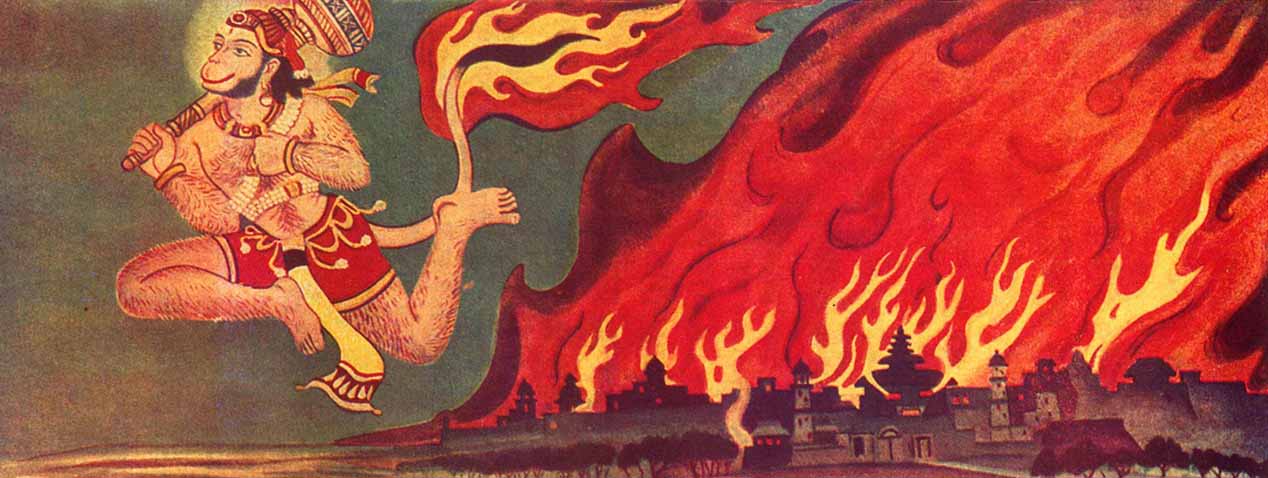Lesson 4
Hanuman Burns Lanka

“Hearing Hanuman's faithful narrative, Rama, full of joy, said: ‘The mission that Hanuman had carried out is of great significance an the most arduous in the world...
‘Who is able to capture that citadel by assault, that has been rendered inaccessible by its rampart of titans, but one whose courage and valour are equal to Hanuman's? Hanuman has carried out this important service for Sugreeva by manifesting a strength equal to his audacity.
‘That servant to whom his master confides a difficult task and who acquits himself with zeal is said to be a superior man. The one who is ready and capable but who yet does no more than himself agreeable, is called an ordinary man, but he who is well and able and does not carry out the command of his king, is said to be the least of men. Hanuman has fulfilled the task confided to him unfalteringly....
‘Yet even so my heart is heavy, since I am unable to requite the bearer of these good tidings in fitting manner.’” (from Valmiki, trans. Hari Prasad Shastri)
Defining the Dilemma
Hanuman, emissary and loyal servant to Rama, finds Sita imprisoned in Ravana’s palace, assures her that help is on the way, and, in turn, is captured by Ravana’s demon soldiers. Viewed as a spy, Hanuman who has killed Ravana’s younger son Aksa in battle, is delivered to Ravana for retribution.
Impressed with Ravana’s charm, nobility, heroism and splendor, Hanuman notes the fact that Ravana is, however, “devoted to unrighteousness.” Similarly struck by Hanuman’s “majesty of appearance and strength,” Ravana attempts to ascertain the purpose of Hanuman’s visit and his reason for laying “Asoka-grove to waste.”
Proclaiming that he is a messenger for Sugreeva, Hanuman states that he acted in self defense and pleads with Ravana to restore Sita to Rama or to fall victim to Rama’s wrath. Furious at hearing Hanuman’s words, Ravana orders Hanuman’s death.
Vibhisana, Ravana’s brother, intervenes at this point and counsels Ravana to follow the scriptures and exact the appropriate punishment for Hanuman'“s crime. Ravana "appreciated the counsel and accepted it with intelligence.” He chooses, instead, to order his demons to set fire to Hanuman’s tail in an effort to show that such mischief is intolerable.
Enduring the punishment, Hanuman seizes the opportunity to observe Lanka during the day in an effort to gather military information for the future. Hanuman is “intrigued” that the fire does not burn or hurt him and concludes that it is Sita’s grace and Rama’s glory that prevent injury to him.
Hanuman frees himself from his bonds, and with his tail ablaze, flies around Lanka, destroying the town. Pleased with his exploits, the gods and sages sing Hanuman’s praises. However, Hanuman begins to fear that his angry actions (for he does act out of anger) may have unwittingly contributed to Sita’s death. He discovers that Sita is, in fact safe, and delighted to hear this news, he prepares to return to Rama.
Outcomes / Consequences
If Hanuman does burn Lanka, does this act effectively dishearten and demoralize Ravana and his army? In what ways does this contribute to the final outcome (with Rama and Ravana meeting in battle)?
If Hanuman burns the city, could it perhaps reveal Ravana as an inauspicious character (particularly to his own army)?
If Hanuman does not burn Lanka, could his mission still have been accomplished? Consider the fact that his freedom was not really at issue here.
If Hanuman escapes the city of Lanka without burning it, would he be deemed less loyal to Rama? Does his burning of Lanka exceed Rama's expectations of loyalty?
Dharma
- good and righteous conduct in performing your life's roles
- performing your role correctly given a certain situation and time.
While Hanuman achieves certain goals in his burning of Lanka, were these the most righteous means to his end? Given the situation and time, could Hanuman have opted for other choices that would have been more commendable, and thus more principled?
Ultimately, in burning Lanka, Hanuman acts out of retaliation (and anger) to counter the retaliation of Ravana and his army. Is this act morally defensible, and is Hanuman fulfilling his dharma in the most fitting way?
Ravana listens to the advice of his counselors, and in doing so, chooses not to kill Hanuman but instead opts to set his tail afire. What role does dharma play here? Is Ravana's "proper punishment" of Hanuman less vindictive, and does it warrant greater merit than Hanuman's burning of the entire city of Lanka?
Finally, Rama and Ravana meet on the battlefield. Does Hanuman's prior action significantly contribute to Rama's vanquishing of Ravana? If so, has he (Hanuman) effectively fulfilled his dharma? If not, why not?
Questions
Brainstorm and discuss the following questions as they relate to this scene.
- Is the action correct according to dharma?
- Is it realistic according to human nature? (Perhaps a discussion of the varying cultural norms in Eastern and Western societies would be appropriate at this time.)
- What would you have chosen to do in this situation? (Perhaps a role-playing activity could work here, with students expressing their motives through the characters' perspectives.)
- What situations have you experienced, or are you aware of, that parallel those in this scene of the Ramayana?
Extensions
- Ask students what current or historical issue illustrates the same type of dilemma.
- Ask students what comparable piece of literature illustrates similar dilemmas.
- If this were to be viewed as a contemporary dilemma, what factors or variables would contribute to the outcome?